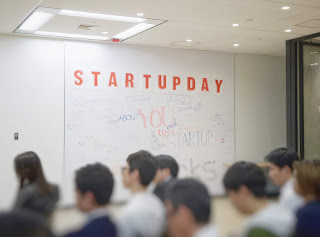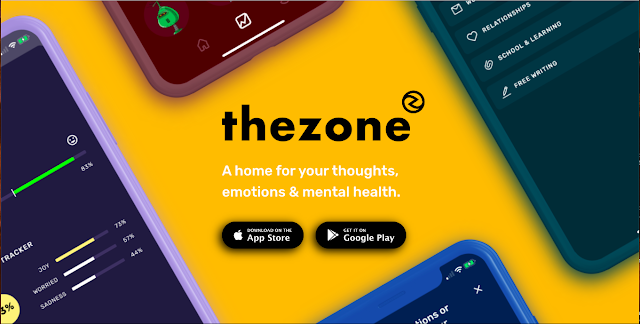Mobbin - Library of the Latest Mobile Design Patterns
1. Can you share with us how did you come about this idea for Mobbin?
 For the past three years, I have been designing mobile (iOS and Android)
interfaces for clients as a freelance designer. Before designing for a product, the first
thing that I would do is to conduct competitive analysis and create moodboard as part of
UI/UX research. So basically I would check out the well-designed apps from the App Store and take notes of how the
apps worked and also the look and feel of them. But to do that you need to jump
through many hoops from signing up process to taking a bunch of screenshots
which takes a long time. And then after I'm done with my research, I would
usually delete it but there are times when I have to revisit the app. I find it
very painful to repeat the process again and again for different projects. I
had my friends who were doing freelance design as well. And they were facing similar
problem as well. So what I did initially was to create a Dropbox folder where I
uploaded the screenshots of the apps for myself and my friends to take a look
whenever needed. We used it frequently but we wished there could be ways for us
to categorize the screens so that it would be easier for us to quickly search
for specific type of screens. However, Dropbox and Google Drive do not have a
comprehensive tagging systems where you can filter through the tags and search
for the things you need. So I decided to
build the web app to solve those problems. It took me three month to build the
first version and then launch Mobbin with all the features we thought of. My
friends and I loved it. Therefore, I decided to share it with the design
community in the world. And that's how Mobbin got started.
For the past three years, I have been designing mobile (iOS and Android)
interfaces for clients as a freelance designer. Before designing for a product, the first
thing that I would do is to conduct competitive analysis and create moodboard as part of
UI/UX research. So basically I would check out the well-designed apps from the App Store and take notes of how the
apps worked and also the look and feel of them. But to do that you need to jump
through many hoops from signing up process to taking a bunch of screenshots
which takes a long time. And then after I'm done with my research, I would
usually delete it but there are times when I have to revisit the app. I find it
very painful to repeat the process again and again for different projects. I
had my friends who were doing freelance design as well. And they were facing similar
problem as well. So what I did initially was to create a Dropbox folder where I
uploaded the screenshots of the apps for myself and my friends to take a look
whenever needed. We used it frequently but we wished there could be ways for us
to categorize the screens so that it would be easier for us to quickly search
for specific type of screens. However, Dropbox and Google Drive do not have a
comprehensive tagging systems where you can filter through the tags and search
for the things you need. So I decided to
build the web app to solve those problems. It took me three month to build the
first version and then launch Mobbin with all the features we thought of. My
friends and I loved it. Therefore, I decided to share it with the design
community in the world. And that's how Mobbin got started.
2. What is your business model?
We provide a pro subscription where the subscribers enjoy extra
features such as version control and access to unlimited libraries of
screenshots on our platforms. We also generate revenue about 3k depending on
the sponsors we get. We are also
preparing for 2.0 launch as well and that'll be interesting.
3. As you are still studying in university currently, do you struggle
between being a student and an entrepreneur at the same time?
I spent 99 percent of my time doing other stuff since year one
basically. I was from business school but I already knew how to code and was
working on my side project which is building personal saving assistant app. And
when I launched it in the App Store and it was featured in the "New Apps
that We Love section” in the app stores. Afterwards it was growing pretty
quickly so I decided to take a leave of absence at Year 1 Sem 1 to focus on the
app development. It was a fun experience but it did not work out well as I was
not really passionate about the problem I was trying to solve. There is a huge
difference in being passionate in the idea and the problem. When I came back, I
switched to Computer Science because I thought it would suit me more and I
haven’t been spending much time (I don’t have time as well) since then on
studies as I knew that I would learn much valuable stuff as a product or
startup guy by just doing and building things for users.
4. How do you know that this is the idea that you really want as
compared to your last attempt?
I think it's because Mobbin is a product that I use personally and
it solved my own problem. When I launched it to the public, they loved it and
kept giving me feedback. They discussed about problems that I could totally empathize
with. By talking to our users, I knew that there are more and bigger problems
to be solved in the design space and my passion grew larger day by day. And so
I knew that this is the product that I enjoy building over the next decade. And
the problem is something I'm really passionate about. It's different from my
first attempt which I didn't understand the market enough and didn't empathize
with the problem that the users face. So my passion died down quickly. But for
Mobbin, I have been working for almost two years and still learning from our
users and trying to ship valuable features for
our users. I really enjoyed doing so. I think when it is the problem and
the product you really care about, it
motivates you to decide at this point that I'll be working on for the
next decade and I want to turn into a startup. Mobbin initially started as a
side project but it became a startup because I wanted to solve bigger problems
in the space. You also need to be realistic about it because you need to be able
to see the untapped big market. And that's what sets a side project, or rather
a small business and a startup different.
5. Mobbin is currently in SoC I&E programme, what's your biggest takeaway from this
program?
First of all, it is a privilege to get the office space in iCube.
And as we grow a team and hire interns, we definitely need a space to work
together. And I think Furnace provides an excellent space for studnets like us.
School is nearby so we can come back to office after lessons and start working.
In terms of financial support, we got 10K grant from SoC I&E program for
which helps us to manage our expense on infrastructure and lessen our burden on
that which was really good. The community here is actually growing. I am
actually now in NOC program with Mobbin and I ask my fellow NOC people to join
Furnace and they really applied and got in. The number of startups here is
growing and the community that we create is also valuable in a sense that we
get to hang around with people who are interested in solving the problem and
building products to reach out to customers and users. So I would say that the
office space, the financial support and the community are the three greatest
takeaways from SoC I&E.
6. Do you receive any mentorship guidance from SoC I&E and how the
interactions been like?
Prof Lai is my mentor and we do have a quarterly meeting or whenever
I need guidance. I think it is more than sufficient for me to update them on
the progress. When I feel like discussing about certain problems that I am
struggling with that I would also take that chance to discuss it. Sometimes I
feel that writing reports are like a task but the good thing is that it allows
me to clear my thoughts when I'm writing down on all these answers to the
questions such as what am I doing, what kind of progress that we have made,
what are the goals for next quarter etc. Being structured allows me to organize
my thoughts and answer the questions well which is good for me and my team as
well. So I don't see that as a bad thing.
7. Do you have any advice for fellow students who have ideas but are
unsure whether to turn into action?
I would say that don’t care too much about the grades if that’s what
you’re worried about. If you are really interested in the idea, you shouldn't
be afraid to sacrifice. Grades are very small thing that you can give up on and
if you are even worrying about grades, I think you are not ready yet to embark
on any kind of journey. We are all students. We have nothing to lose. What we
have is just time. And if you invest the time correctly, it doesn't have to be
successful, just building it, shipping it
to users is a huge achievement. You feel that sense of pride when you do it.
And you will learn so many things even though it doesn't work out at the end. I
learned so many things from my first attempt back then in year one. I promised
myself that I will never make the same kind of mistakes again and it levelled
me up as product person.
You can come up with an idea anytime. You can be interested in
startup and get a team and say lets come up with an idea and work on something.
It shouldn't be that way. What should be the way is that you should always have
this problem mode on in your life if you want to be an entrepreneur so that you
can spot that this is a problem that you encounter and whether you can bring it
to the next level. So it is very important to notice and realize that there is
a problem and then you can create a solution to it.
If you are interested to start your own companies or have any questions, please contact us!



Comments
Post a Comment